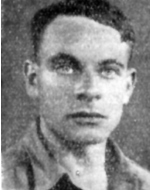Feist, Yehuda (Louis, Lewis)
Son of Ilza and Hanoch, was born on the 5th of Sivan 5662 (June 6, 2222) in the city of Frankfurt am Main to a well-to-do family dedicated to the religion of Israel and religious Zionism. From his childhood, he aspired to return to Zion and build the Temple. As he said in his childish version: “I will be the builder who will build the Temple.” In 1936 he fled with his family to the Netherlands against the Nazis who came to power. He taught a group of religious youth at the high school in the Netherlands, and when he was 16 he preached in writing and orally to help the refugees who had fled Germany because of the Jewish riots that took place during the “Kristallnacht” In 1938. Yehuda moved with his family to England and on the basis of his graduation certificate he received a certificate as a student and immigrated to Israel in January 1940. Here he studied at the Hebron Yeshiva in Jerusalem and then studied agricultural chemistry at the university. In Sodom, against the will of his parents, he joined the British army in 1942 and served in the “Baps”, the former battalions He took part in the revenge battles on the northern Italian front and later on in material and spiritual aid and relief for She’erit HaPleita in Belgium and the Netherlands (which had previously dealt with them in Italy as well) Where he completed a research project on the soil, on the water infiltration and storage methods, as part of Prof. Reifenberg’s research, and was about to receive his master’s degree in natural sciences. His acquaintances describe him as the embodiment of conscience and loyalty to religious, national and human duty. He devoted time to Torah and prayer, living simply and modestly, saving himself even at the time not being wasted, giving money to charity, trying to give the Torah and knowledge to the needy, taking care of the food of treifot in the army, both in World War and in the Homeland War; . Did not see in his actions a special right for himself, but an obvious duty that must be fulfilled as much as possible. At the beginning of December 1947, with the outbreak of the War of Independence following the UN General Assembly resolution on the Partition Plan, he enlisted in a religious company in Jerusalem, trained in the use of weapons, participated in all operations as a machine gunner, Returned to Beit Hakerem and took part in “Nachshon”, in the Battle of Hartuv, etc. When his company was sent to Gush Etzion, they left him in Jerusalem as a student on the verge of completing his studies, but he refused and arrived in the last convoy on the 16th of Adar I 5708. He was the commander of the mortar squad In the central position of the bloc, in the Russian monastery, where he worked against the Arab transport on the Hebron-Jerusalem road and went out on cover nights too In his difficult service, the officer in the Gush remembered his private duty and sent his rental bill to the owner of his room and made him a messenger to inspect the chametz in his room on the night of 14 Nissan. On May 5, 1948, when the Arabs first occupied the monastery, it remained the last name to retreat until the wounded were removed. When our men returned to the monastery, he returned to defend him, and in the last and decisive assault of the enemy, he took a mortar from the front position of the monastery until he was summoned to a nearby position to repair the Bren machine gun that was hit by the shell. Where he was told that they were retreating and he announced that he would not withdraw without an order from the commander (Zvi son of-Yosef), returned to his position and caused casualties to the assailants, and when the monastery was already in the hands of the legion he told his comrades to retreat and he would follow them, but he remained alone in the position, The Gush, when they returned from captivity in Transjordan, saw itRecently, only one has been standing and the Arabs are attacking it. Where he fell as a defender of Israeli soil in the Hebron hills on May 12, 1948. After his death, he was promoted to the rank of lieutenant and was offered the “Hero’s Medal.” On the 17th of Cheshvan 5710 (17.11.1949), he was laid to rest In the military cemetery at Mount Herzl in Jerusalem.
